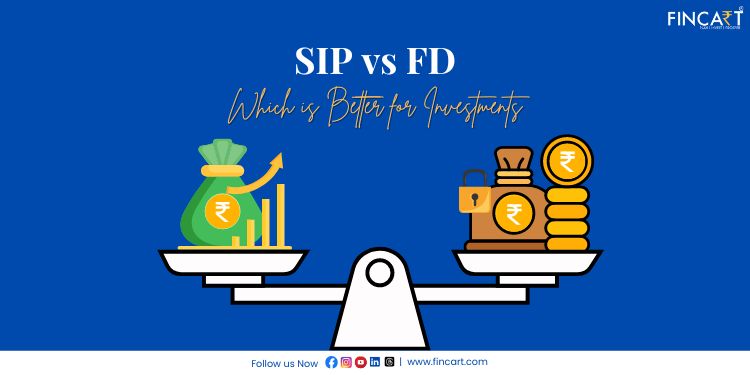Table of Contents
ToggleTraditionally, Indians have preferred to invest their hard-earned money in a Fixed Deposit. But the tide has turned in recent years. Now Indian investors are looking at alternative options such as mutual funds to get better returns and more flexibility and control, even though they have to deal with market risk by investing in them. One way to invest in mutual funds is through a Systematic Investment Plan. SIP allows investors to make regular and fixed investments in mutual funds, generally on a monthly basis, rather than investing a lump sum amount all at once. So what is the reason for this shift? What’s the difference between SIP and FD? In this blog, we will explore sip vs fd. Let’s begin!
SIP vs FD: Key Differences Between SIP and FD
Let’s look at some of the major differences between SIP and FD before we can answer whether SIP is better than FD.
| Fixed Deposit (FD) | Systematic Investment Plan(SIP) |
| Investments made in large lump sum amounts. | Small, regular investment made over a period. |
| Suitable for investors with low risk appetite. | Suitable for aggressive investors with high risk appetite. |
| The returns are in the form of interest on the principal amount. | Returns are in the form of capital gain (profit made after selling) and dividends. |
| Returns are guaranteed. | Mutual fund returns are linked with the market, and hence not guaranteed. |
| Investment is low risk. | Subject to market risk, which can be managed by diversification and regular investments. |
| There is a lock-in period. If you withdraw before maturity, a penalty is charged. | Different schemes have different rules for withdrawal. In most cases, one can redeem at any time they wish. Sometimes, however, an exit fee may be applicable. |
| Tax is charged as per the income tax slab. | The tax depends on when the redemption was done. Based on the holding period, a short-term capital gain (STCG) tax or long-term capital gain (LTCG) tax is applicable. |
As you can see, there are quite a few differences between the two options. Very briefly, one can say that fixed deposits are more suited to conservative investors looking for guaranteed returns, whereas Systematic Investment Plans are more attractive to investors with high risk tolerance. The returns offered by both these instruments reflect the level of risk one has to take to achieve them. So, SIP or FD which is better? Let’s answer that pressing question in the next section.
SIP vs FD – Is SIP Better than FD?
Let’s take a more detailed look into the various aspects of SIP and FD.
Type of Investment:
When you invest in an FD, you need to make a one-time lump sum payment. Therefore, one must possess a large investible surplus, that is, investors must have a significant amount of disposable money available to invest upfront. This requirement may not always be feasible for everyone, especially those with limited disposable income. SIPs allow investors to make regular payments in small amounts over a long period. This option offers accessibility and flexibility.
Returns and Financial Goals:
The returns offered by FDs help beat inflation, so the main purpose of investing in FDs is to preserve the capital. Mutual fund SIPs on the other hand offer higher returns, so one can invest in SIP to meet various financial goals such as building an emergency fund, buying a home, or funding a child’s education. Returns are assured in the case of FDs, while SIP returns are market-linked.
Flexibility:
When you invest in a mutual fund SIP, you can start with an amount as low as Rs. 500. You can change the instalment amount anytime you want. Should you encounter unexpected bills you can even pause your SIP and resume it when you want to. Investing in FD however, requires you to make a large commitment upfront.
Liquidity:
The money you put in an FD gets locked in till the maturity period, which you select. If you break your FD prematurely, the bank can charge a penalty. On the other hand, you can redeem your units anytime you want by taking the SIP route. A small exit fee may be applicable, so read the scheme documents before investing.
Risk:
FDs are very low risk, which is why they were historically the preferred option amongst investors. Mutual funds, however, have varying levels of risk associated with them. A debt mutual fund, for example, has lower risk and returns compared to a Balanced Advantage Fund (BAF). Similarly, BAFs are lower risk than equity mutual funds. The returns are also market-linked, so they are prone to short-term market fluctuations. However, with a solid risk management strategy, investors can ride out market volatility through diversification and asset allocation and make significant profits over the long term.
Taxation:
The interest you earn by investing in an FD is chargeable as per your tax slab. If you want to reduce your tax liability, you can invest in a tax-saving fixed deposit. These FDs have a maturity period of five years and allow investors to enjoy tax benefits up to Rs 1.5 lakh under Section 80C of the Income Tax Act. Mutual funds attract LTCG and STCG tax.
Equity Linked Savings Scheme (ELSS), also sometimes called tax saving mutual funds, also offer tax benefits of up to Rs. 1.5 lakh under Section 80C of the Income Tax Act. However, compared to the five year lock-in period of tax-saving fixed deposits these funds have a lock-in period of only three years, making them a great option for tax planning and wealth creation.
Based on these factors, we can choose between SIP or FD. The boring answer is that everyone is unique, so the ‘better’ option between the two depends solely on your financial goals, risk tolerance, investment horizon, and current financial situation. That said, while there is market risk associated with mutual fund SIP, it’s not something that cannot be managed. Warren Buffet once said, “Risk comes from not knowing what you are doing.” It’s simple really. With proper research, knowledge, and informed decisions, one can mitigate these risks and reap the higher returns of mutual funds.
If you can effectively manage the risk associated with mutual fund SIP, there is no reason not to go for it. A financial planner can not only make a customised financial plan based on your unique financial situation, but also help you manage risk by optimal asset allocation, diversification, and regular portfolio monitoring.
Ready to grow your wealth?
Partner with Fincart for expert investment planning and make your money work for you.
What is a Fixed Deposit?
Fixed deposits are offered by financial entities such as banks and non-banking financial corporations (NBFCs). An FD is a type of investment that allows you to invest a large lump sum amount for a specific period and at a fixed interest rate. This interest rate is paid out regularly, such as every month or year. The returns of an FD aren’t market-linked, so FDs provide a level of stability and predictability to their returns and are a good option for individuals with a more conservative approach to investment planning. Some FDs even give investors the option to reinvest the interest, which allows compound interest to work its magic.
These FDs are called cumulative fixed deposits. NBFCs offer corporate FDs, which generally have higher interest rates than bank FDs, but also come with a higher risk level. Tax saving FD can help investors get tax benefits. Such FDs have a lock-in period of five years, during which investors cannot withdraw their funds without penalty.
What is a SIP?
It’s important to note that a Systematic Investment Plan is not a financial product itself. Rather it is an approach that allows you to invest in financial products such as mutual funds. You can invest in a mutual fund by investing a lump sum or by making small, regular payments over a time period, called SIP. It is a fantastic approach for individuals just starting their investment journey, and for individuals who do not have a large investible surplus to invest in one go.
SIPs offer many benefits, such as rupee cost averaging, compound interest, and higher returns. SIPs have made it convenient for investors with modest incomes to take part in the financial markets. Due to their high flexibility, one can start, stop, or pause their SIP any time they need. One can also change the monthly contribution amount as their financial situation changes.
SIP investment is highly effective in the long term. Because the returns get reinvested, investors receive interest on interest, which snowballs and creates substantial wealth over time. There are many types of mutual funds in the market, such as equity mutual funds, debt funds, and hybrid funds, that cater to diverse investment preferences, risk profiles, and financial goals. Thus, SIPs also provide versatility in goal-based financial planning.
Also Read: How to Invest in SIP?
Wrapping Up
In some cases, conservative investors may not have the large lump sum required to invest in a fixed deposit. That doesn’t mean they have to go out of their comfort zone and invest in high-risk mutual funds via SIP. There are mutual funds that are specially made for conservative investors like debt mutual funds, where most of the investment is done in debt-related instruments such as government bonds, corporate bonds, and other fixed-income securities. These debt mutual funds are ideal for conservative investors who want relatively stable returns and lower levels of risk compared to equity-based investments. Remember, while these funds are generally safe, their returns are still market-linked.
A SIP investment advisor can analyse your risk tolerance, financial goals, time horizon, and current financial condition and recommend suitable mutual fund SIP. With the help of an investment advisor, you’ll be able to make informed decisions and readjust your portfolio as things change. Due to the high accessibility and convenience offered by SIPs, coupled with their compounding returns, there is no reason why one shouldn’t consider incorporating them into their investment strategy as soon as possible. Start your SIP journey today!




